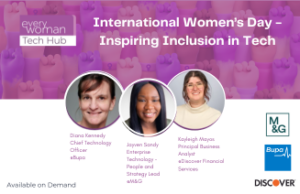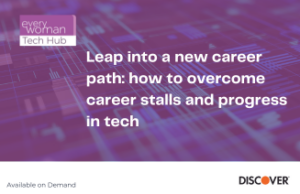‘MANY WOMEN COMING UP IN TECH WANT TO KNOW HOW I HAVE MANAGED TO BE WHERE I AM.’ — EXPERIAN’S ANGELA BETETA QUESADA ON THE IMPORTANCE OF RELATABLE ROLE MODELS

Principal DevOps Engineer, Global Decision Analytics at Experian, Angela Beteta Quesada discusses the importance of relatable role models for women in the tech industry and how making the right choices in where and how you work can open up a wealth of different people to learn from.
Over her 15-year career in tech, Angela Beteta Quesada has often been one of the very few women ‘in the room’ — especially at senior levels. Currently Principal DevOps Engineer, Global Decision Analytics at Experian, she discusses the importance of relatable role models for women in the tech industry as they move through their career — and how making the right choices in where and how you work can open up a wealth of different people to learn from.
How important were relatable role models at the start of your tech career?
My first role models were my mom and dad, because I grew up in an environment where both worked, and where diversity was normal. They knew many different types of people and always wanted me to understand that we all have a place in this world. My mom was the one who encouraged me to become an engineer — she always thought that computer science and software engineering were going to be ‘a thing’ in the near future. And she always reminds me that when I first started in tech, I didn’t want to carry on doing it, and that feeling went on for quite a while. I would come home saying, ‘I don’t feel part of that group of people; there are only eight women. My friends are doing economics or marketing, which are cool careers for women. What am I doing here?’ As a woman, I have felt like an ‘alien’ in tech from the beginning of my career and I do even today; the thing that has changed is my perception around that.
I feel okay about it now because I have the confidence that what I’m doing is my thing. I didn’t have that confidence when I started and with so few women in tech at the time, there weren’t really any role models I could see and relate to in my immediate environment. I also didn’t feel like a ‘tech’ person back then, and that is another important aspect of role models — they allow us to see that there are different roles and different types of people in tech; they can help to normalise that reality.
What makes an effective role model, and why?
There’s a sense that ‘role models’ always need to be really senior, with a lot of energy and power. But relatable role models can often be more effective in giving you confidence and pointing the way to the next step. And these can be people at any stage of a career — perhaps your line manager or someone just a few levels up from you, and male or female.
As a role model I think I am relatable; I like to take risks and opportunities that are a challenge to me — and that I think are going to be good fun. That is how my whole career has developed. I also work well with people and have good communication skills — when I was a junior Java engineer, my mantra was ‘leave it with me’. I think my managers saw that they could throw things at me and have confidence that there was going to be a good result, which is a mindset I still have.
What do you feel young women at the beginning of their career can see in you that will be useful to take with them in their career?
If someone looks at me they are going to see someone who is happy in taking challenges with no fear of continuing to grow; a person with a strong sense of which opportunities are good for her; and someone who is always respectful with other people. I think that the role that my family plays here is very important too in terms of modelling, because my husband is the one taking care of the domestic responsibilities and our son. He made that decision, so he’s very comfortable in being the role model for my son and not having someone from outside play that role. And in turn, that gives me flexibility and the ability to be able to focus on my work and career progression.
How important is it to see more role models combining the realities of motherhood and a high-pressure career?
It’s very important. Many women coming up in tech want to know how I have managed to be where I am. And I always tell them the truth, which is that if I had to do both home stuff and work, I wouldn’t be able to do everything to the level that I want. I took seven months maternity leave after my son was born, and when I rejoined the company, I began to take on more and more responsibilities.
Two years ago, when my son was a year and a half, I decided ‘I’m going to stop here’. I felt as if I could keep throwing things on top of myself, but that was not how I wanted to live. My husband and I had got to a point where we needed external childcare to make it all work, but the result of that was that neither of us spent time with him and we thought, ‘Really, this is what we want for him?’ It was my husband who said,’ I’m going to leave what I’m doing’, and because he is taking on all the other responsibilities it means I can keep progressing and put in 10 or 11-hour working days. I wouldn’t be able to be where I am without that support.
What advice would you give to a young woman starting her career in tech?
Those strong women with great stories about achievements and how they’ve had to break barriers and convince people, especially men, that they were equally capable of being there are important. They play a key role for all of us in showing that success is possible and deserved, but I don’t personally feel as if I have had to make extra effort because of my gender in tech during my own journey to get where I am. I think that is mainly because I have a ‘sixth sense’ around making good decisions about where I work and the managers that I work for.
Feelings and emotions are important to me, and I take special care in picking companies that support and take care of me — and those types of company are the ones that put diversity and respect high in their standards. You have to be careful to make the right choices for you; if you do that, you’ll be happy at work and able to feel this sense of care from people about your growth — and it will also be easier for you to find role models that work close to you too.
Do you still look for role models in your own career?
I’m influenced by who I work with and often they are my role models. I like to work with junior and senior colleagues and leaders at work and there are always learning opportunities from the people that are near you. Those starting their careers or beginning a new role often bring incredible energy and fresh style and I am amazed at the perspectives and views that they offer. I’m so grateful to work and support them in their evolution/growth. Senior colleagues and leaders by contrast give me the experience, the confidence, the stories about success and the opportunities to get inspired and to keep growing. There is no one single reference; references can be anywhere, if you stay open to being influenced.



